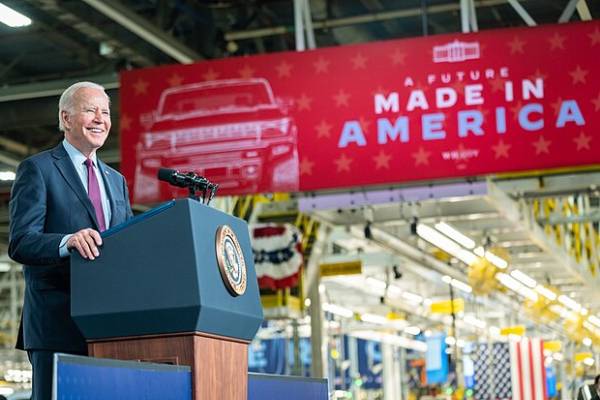U.S. Manufacturing is Growing but Employment Not Keeping Pace
In a new op-ed, Harvard economist Dani Rodrik lays out some harsh realities of the U.S. manufacturing industry
From the outside, the U.S. manufacturing appears to be thriving. In the past three weeks alone, the Biden administration committed nearly $13 billion toward the creation of semiconductor factories in Arizona and Texas, and the Federal Reserve reported higher-than-expected growth in U.S. industrial production for March. The White House claims that roughly $300 billion in manufacturing investments have been committed in the US over the past two years
Beneath the surface, however, the situation isn't as rosy as it appears. That's the contention of Dani Rodrik, a professor of international political economy at Harvard Kennedy School.
In a recent op-ed published in Project Syndicate, Rodrik points out that while labor productivity in U.S. manufacturing has jumped by almost six times since 1950, the rest of the economy has only doubled its productivity. Despite this surge in productivity, however, six million manufacturing jobs have been lost since 1980, while 73 million non-farm jobs have been created elsewhere, primarily in the service sector.
Under both the Trump and Biden administrations, the share of manufacturing jobs has declined, despite billions in investments and substantial commitments from the private sector. Simply put, the return in terms of job creation has been poor.
To prove his point, Rodrik looks at the newly announced semiconductor plants in Arizona. Although these plants are expected to generate 6,000 new jobs, the total funding allocated to them amounts to $6.6 billion, translating to over $10 million per job.
“Even if the projected tens of thousands of additional jobs in supplier industries materialize, that is a paltry return for employment,” Dobrik says of the Arizona plant.
This trend isn't unique to the United States. Germany, South Korea, and even China are experiencing declines in manufacturing employment due to automation and advancements in technology that favor skilled workers.
Rodrik ultimately says that “Automation and skill-biased technology have made it extremely unlikely that manufacturing can become the labor-absorbing activity that it once was,” and instead advocates for “services such as retail, care work, and other personal services” as the “primary engine of job creation.”
He concludes by saying that the CHIPs Act and other policies to boost manufacturing “may well strengthen the country’s manufacturing base and promote greater innovation. But rebuilding the middle class, generating enough good jobs, and reinvigorating declining regions call for an entirely different set of policies.”
Article Topics
Harvard University News & Resources
U.S. Manufacturing is Growing but Employment Not Keeping PaceLatest in Warehouse|DC
Senators Take Aim at Amazon with Warehouse Worker Protection Act Talking Supply Chain: Supply chain’s watchdog Ranking the World’s 10 Biggest Supply Chains The Top 10 Risks Facing Supply Chain Professionals Walmart’s Latest Service: Ultra Late-Night Delivery Dollar Tree’s Oklahoma Distribution Center Decimated by Tornado European Parliament Passes Law on Supply Chain Accountability More Warehouse|DC











